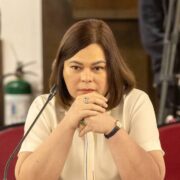Redemption

The idea of redemption, her youngest daughter Danielle recalled, was one her mother deeply cherished. When writing of her distinguished parents, the businessman-educator Salvador Araneta and the philanthropist Victoria Lopez, she’d titled their lives as a love affair with God and country.
And indeed, if one takes either of these—or both—seriously, as her parents and she and all her siblings did, then the idea of redemption is essential: redemption of sinners so that they, too, with contrition, can enter the Kingdom of Heaven, and redemption of peoples and nations dealt injustices by other nations, and the people and their leaders themselves.
Enough time has passed so that scholars like Lisandro Claudio have been able to take a fresh look at the lives and ideas and ideals of individuals like her father; too much time has passed for the vividness, the force, and strength of character, of individuals like her mother to be appreciated because there are all too few for whom her mother is still within living memory: it was to the task of recapturing that life that she’d turned to in her last years.
But those were also last years spent not in the warm glow of memories but instead, engaged in the challenges of our times. When an entire nation seemed inclined to either applaud or turn a blind eye to the cult of officially sanctioned liquidations, she supported and sponsored masses and programs to defy the Tokhang Death Cult. Similarly, for decades, she had forcefully and with personal commitment, supported environmental causes when it seemed nothing more than a fringe eccentricity.
I admired her most when she bucked public opinion by very publicly opposing tokhang and I always felt that her support of the clergy who counseled and gave support to victims’ families was an early sign of one of the most interesting phenomenons of that era: prelates who directly challenged Duterte were few and far between but there seemed many more humble parish priests willing to speak up; and when the formerly very conservative Dominicans began to have the bell of the University of Santo Tomas chapel rung in solemn protest, any Catholic had to know that a moral tide had turned.
In other words, redemption was possible; shepherds might be remiss in guiding their flocks but they too could be awakened. With similar fortitude she had sounded the environmental alarm for lonely years; her indignation ringing from her family chapel was repeated from many more belfries; neither God nor country would ever be permanently forsaken.
I was never forsaken by her. She’d taken a lively interest in my abilities and in 1994 she and her daughter had encouraged and then supported my writing; it’s been 30 years and she always made a point of involving me when she could, in writing about her causes.
The last time we communicated about one of these was a few weeks before she passed away. She’d been taken aback by a bishop who seemed more concerned over domestic racism than what was happening in the West Philippine Sea. She didn’t see why objecting to one should be accompanied by defeatism on the other. She wrote a prayer and asked that it be shared with as many people as possible:
“Blessed Mother Mary, we, the Filipino people, invoke your protection over our sovereign territories on land, on air, on sea, and all the bounties under the sea, and on the sea, As well as all our natural resources which is the patrimony of the nation.
“Dear Mother Mary, help us keep our freedom of navigation unimpeded. We pray, you be with us. Touch our mind so we may be truly yours; Hold our hands and bless them, so corruption won’t taint what we touch. Strengthen our resolve so we will always choose you and your Son Jesus Christ above all others.
“Bless those who protect our West Philippine Sea. May we be free from foreign incursions, intimidation, and aggression. May You, dear Mother Mary, and Your Son Jesus Christ reign forever sa ‘bayan naming ginigiliw.’ Amen.”
But it was what turned out to be her parting words to me that were the most revealing. She mentioned that her health was not the best. Then she brushed that aside and gave me some advice in the form of a command: “Enjoy parenthood!”
She repeated it twice. When her daughter gave word that her mother had passed, in the end, the essence of who her mother was, was redemption. For there can be no motherhood without the conviction that it is always possible: for an erring family member, for a nation, for a people.
Ma. Lina Araneta Santiago, May 20, 1940 – Nov. 8, 2024.
—————
Email: mlquezon3@gmail.com; Twitter: @mlq3


















